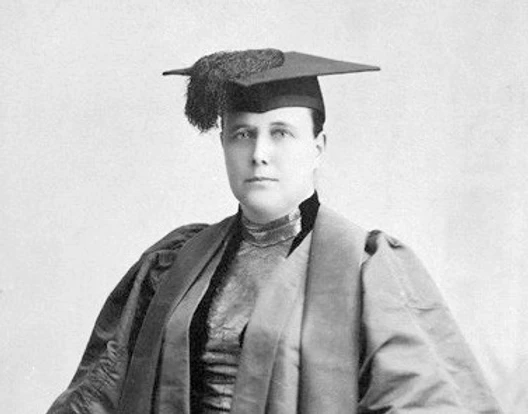Edith Pechey
Edinburgh medical students will be familiar with the name Dr Pechey, as the name chosen by the Medical Teaching Organisation for their social media account, and it does not take much reading on Edith Pechey’s life to realise why.
Pechey was born in Essex in 1845, her father was a minister and her mother was noted to be uncharacteristically well-educated for the time. This perhaps contributed to why after a few years of teaching in a school Pechey decided she wanted more, to pursue her dream as a physician. At the time Sophia Jex-Blake had applied and been rejected to study in medicine, and so sent out an appeal in The Scotsman to other women to apply with her. Pechey was one of the women who responded, but reluctantly. In her letter to Jex-Blake she asked “Do you think anything more is requisite to ensure success than moderate abilities and a good share of perseverance?”.
Despite her concern, not only did she get accepted to study medicine in Edinburgh alongside the women but she achieved the top mark in chemistry. This should have won her the Hope Scholarship but, in the first of the university’s many attempts to push out the women, it was awarded to the man who got the second highest mark. The university then went on to refuse to issue the women with certificates of attendance for the classes they took. Both these decisions were appealed and while the university eventually issued the certificates they refused to grant Pechey the scholarship, as if admitting that women could be equal to men wasn’t controversial enough, saying they possessed the ability to supersede men was out of question.
Pechey did not let this or the fact that the university refused to allow the women to graduate stop her. She approached the Royal College of Surgeons in Ireland to take a midwifery licensing exam in 1873 and went on to work in the Birmingham and Midland Hospital for Women. Still determined to be a doctor, she then travelled to Switzerland and undertook her medical licensing exam in the University of Bern in German. Around that time the Royal College of Ireland started allowing women to sit the medical licensing exam so she took the test there again and went on to practice in Leeds. She took time off to study surgery at the University of Vienna but it wasn’t until 1883 that she made her big move to Bombay, India.

Courtesy of By Bourne & Shepherd ( https://www.ed.ac.uk/equality-diversity/celebrating-diversity/inspiring-women/women-in-history/edinburgh-seven/edith-pechey)
Indian culture preventing women from being seen or treated by male doctors created a need for female physicians which led to Pechey being offered a position as a senior medical officer in the first hospital built for treating woman and run by an entirely female staff. Later, a project began to build the Cama Hospital – which was supported by the Medical Women of India Fund to which Winston Churchill’s father donated – and Pechey was offered the top post. She used this an opportunity to fight for all female workers to receive equal pay to their male counterparts, as she believed that paying them less would undermine their competence – an argument which remains valid today. She succeeded after some opposition, and throughout the rest of her time in India campaigned for women’s education and against child marriages and forced remarrying of widowers. She also went on to be the first woman to be appointed to the Senate of the University of Bombay.
Eventually Pechey resigned from her position at the hospital when her diabetes began to affect her health significantly. However she maintained her private practice and worked through an outbreak of the bubonic plague and a subsequent cholera epidemic. When she eventually returned to England she started the Medical Women’s Federation in 1882, an organisation which remains active and bringing female practitioners together to this day. She died of breast cancer in 1908 after living a very fulfilling and accomplished life, one whose impact ripples on to this day.
For more on what Pechey and Jex-Blake did after Edinburgh see this blog post:
Author: Aya Riad
References:
https://www.rcsed.ac.uk/news-public-affairs/surgeons-news/march-2019




Recent comments